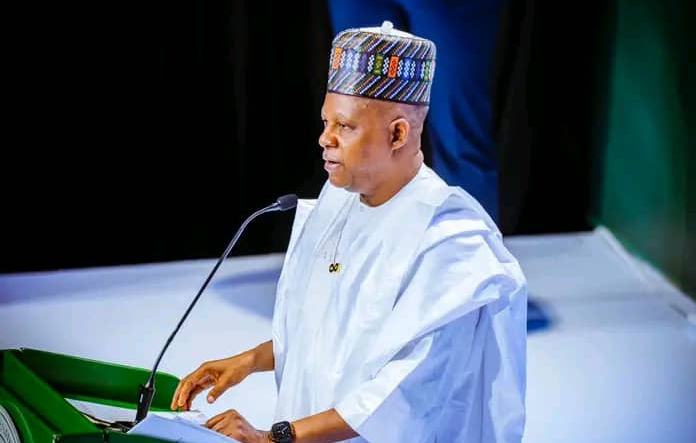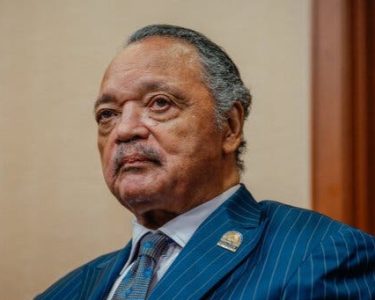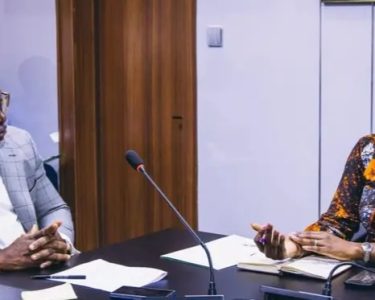…….Attributes his administration’s substantial progress in stabilising economy to sacrifices of Nigerians, Reaffirms resolve to address the plight of poor, unemployed, vulnerable citizens
President Bola Ahmed Tinubu has explained why his administration established the ₦200 billion intervention fund to support micro, small, and medium enterprises (MSMEs) and manufacturers, saying it became necessary to assist them in boosting competitiveness and addressing structural challenges.
He said beyond the GDP growth of 4.23 per cent recorded in September 2025, the economic reforms spearheaded by his administration have started yielding tangible results across sectors, surpassing projections from multilateral agencies and indigenous economic experts.
President Tinubu who stated this in Abuja on Monday when he officially declared open the 31st Nigerian Economic Summit, noted that the belief in the nation’s economic experts had been the magic wand behind his administration’s ongoing reforms.
Represented at the summit by Vice President Kashim Shettima, the President Tinubu maintained that all decisions taken by his administration had been “guided by the pursuit of balance between economic logic and public expectation.”
Stating why the administration established the ₦200 billion intervention fund to support MSMEs and manufacturers, President Tinubu restated his administration’s resolve to rekindle hope for poor, vulnerable and jobless Nigerians by creating corridors for them, especially the youth, to access loans, grants and equity investments.
His words: “As a people-oriented government, our priority remains restoring hope to the unemployed, the poor, the excluded, and the vulnerable. We have created pathways for young Nigerians to access grants, loans, and equity investments of up to 100,000 dollars to scale their enterprises, innovate, and build sustainable livelihoods.
“We established a ₦200 billion intervention fund to support micro, small, and medium enterprises and manufacturers, helping them overcome structural challenges and enhance competitiveness.
“Our expansion of digital micro-loan access has improved financial inclusion, empowering small businesses and stimulating community-level productivity. These efforts underline our commitment to an economy that works for all Nigerians.”
The Nigerian leader attributed the significant progress his administration has made so far in stabilising Nigeria’s economy and rescuing public finance to the patience and sacrifices made by Nigerians.
“As experts in the economy, you know more than the average citizen that the stability in our foreign exchange market is not accidental. It reflects deliberate choices guided by the same economic wisdom that gatherings such as this embody.
“Along with subsidy removal, these decisions have rescued our public finances, stabilised the economy, and reassured investors at home and abroad. We owe this progress to the sacrifices of Nigerians, whose patience and understanding have been the bedrock of our endurance. To them, I say: the better days we promised are already within sight,” he stated.
The President acknowledged what he described as a “resounding consensus” that ongoing reforms by his administration have stabilised the nation’s macroeconomic environment, with the economy “expanding to ₦372.8 trillion in 2024, up from ₦309.5 trillion in 2023.”
Outlining some of the progress made so far in reviving the economy, President Tinubu said, “Our total revenue collection also rose from ₦19.9 trillion in 2023 to ₦25.2 trillion in 2024, and as of August 2025, it had reached ₦27.8 trillion, surpassing the revenue target of ₦18.32 trillion.
“These triumphs and projections are guided by the promise we have made to the nation—to grow Nigeria’s debt service-to-revenue ratio from 97 per cent, where we met it, to a sustainable level.
“Aside from the good news that this ratio has now reduced to less than 50 per cent, I am proud to share that this performance, in our early days in office, inspired Fitch to upgrade Nigeria’s sovereign rating to B with a stable outlook, and Moody’s to lift our issuer rating to B3 with a stable outlook. Both praised our improved economic foresight and clearer policy direction as their barometers.”
For non-oil revenues, the President said it grew by 411 per cent year on year in August this year, with tax-to-GDP ratio now nudging 13.5 per cent, “up from barely 7 per cent a few years ago.
“Our debt-to-GDP ratio now stands at 38.8 per cent, far below the limits set by the Fiscal Responsibility Act at 60 per cent, and those of ECOWAS and the World Bank at 70 per cent,” he added, noting the numbers speak volumes of a nation prepared for the present, just as they represent the promise his administration made to Nigerians.
On why his administration increased monthly federal allocations to states, enabling them to fund critical projects and social interventions, President Tinubu said he came to office “fully aware that the secret to a successful federation lies in empowering each federating unit with the resources and autonomy to pursue development peculiar to its needs.”
Every reform introduced by his administration, the President noted, had been inspired by a “deep reflection and the courage to act in the interest of the nation.”
He thanked the nation’s economic experts and stakeholders in public policy for staying with his administration through turbulent tides, providing insights, offering criticism, and reminding the government that “our collective goal is not comfort in divergence, but progress in convergence.”
The President further assured that the four Tax Reform Acts he recently signed into law “will boost domestic revenue mobilisation, reduce dependence on oil, and simplify compliance.
“These reforms protect low-income earners, ensure fairness in corporate taxation, and strengthen digital innovation in tax administration. By promoting transparency and coordination among all tiers of government, we are laying the foundation for a fairer and more prosperous Nigeria,” the President added.
Declaring the 31st Nigerian Economic Summit open, President Tinubu told participants that he was looking forward to their fruitful deliberations.
Earlier, the Minister of Budget and Economic Planning, Senator Atiku Bagudu, lauded the partnership between his ministry and the NESG, saying it had blossomed for over 30 years, ensuring public and private cooperation for the development of the Nigerian economy.
He pointed out that since May 2023, President Tinubu had been reforming the economy and enhancing productivity in line with the administration’s Renewed Hope Agenda, suggesting a gradual easing of the cost of living and an increase in domestic production.
For his part, Chairman of the NESG, Mr Olaniyi Yusuf, advised relevant stakeholders and authorities to address security as an enabler of reforms, noting that without peace, reforms cannot take root, investors cannot take risks, and Nigerian youths cannot find opportunities for prosperity.
“Tackling insecurity in rural and urban areas alike is vital to unlock productivity and restore confidence,” he added.
In a presentation, the Vice Chairman of NESG, Mr Boye Olusanya, commended the strategic reforms of the Tinubu administration, especially the stabilization of the foreign exchange market, the tax reforms and the removal of fuel subsidy, among others, which he described as bold and critical to achieving the target of building a trillion-dollar economy by 2030.
He said though the reforms are necessary for transforming Nigeria’s economy and achieving other goals, they are largely insufficient in addressing overarching issues in the polity, warning that a reversal of key policy decisions will retard growth and set the country on a backward trajectory in many folds.
Dignitaries who graced the event include the Coordinating Minister of Finance and the Economy, Mr. Wale Edun; Minister of Trade, Industry and Investment, Dr Jumoke Oduwole; Minister of Agriculture and Food Security, Senator Abubakar Kyari; and Minister of Communications and Digital Economy, Mr Bosun Tijjani.
Stanley Nkwocha
Senior Special Assistant to The President on Media & Communications
(Office of The Vice President)
6th October, 2025.
#one Nigeria non-negotiable





